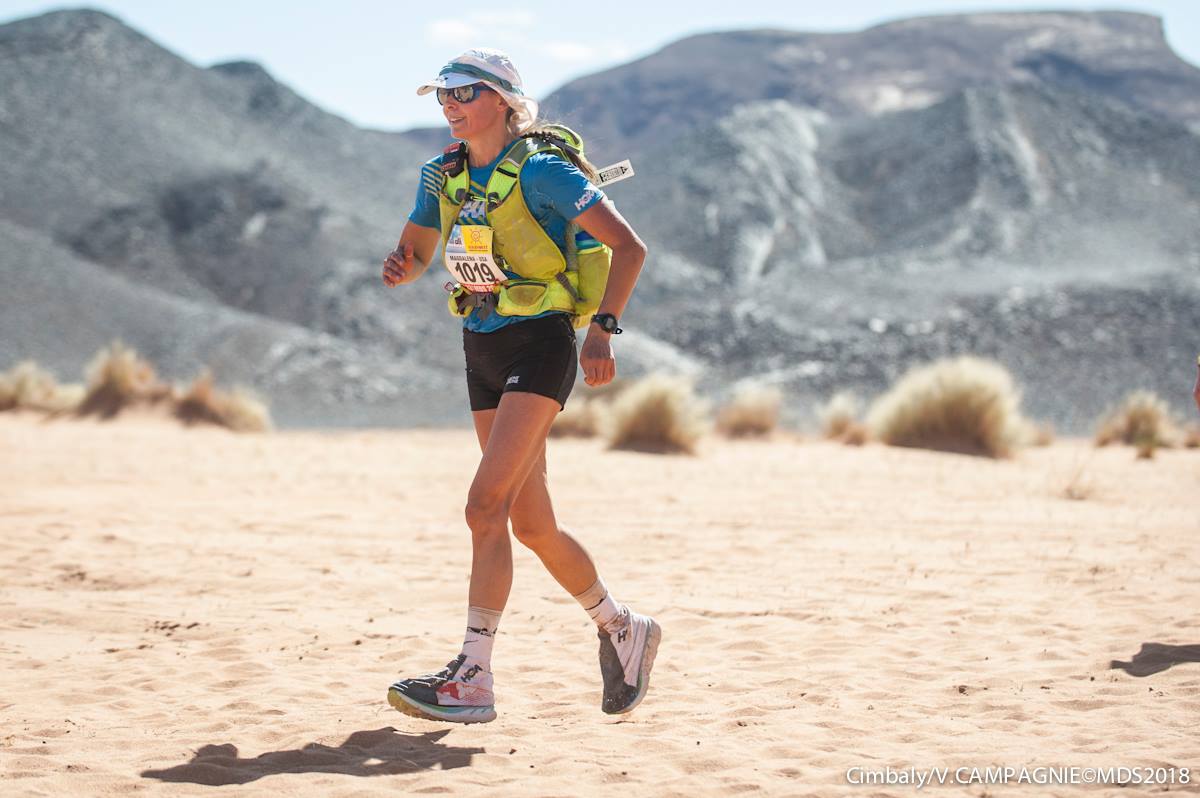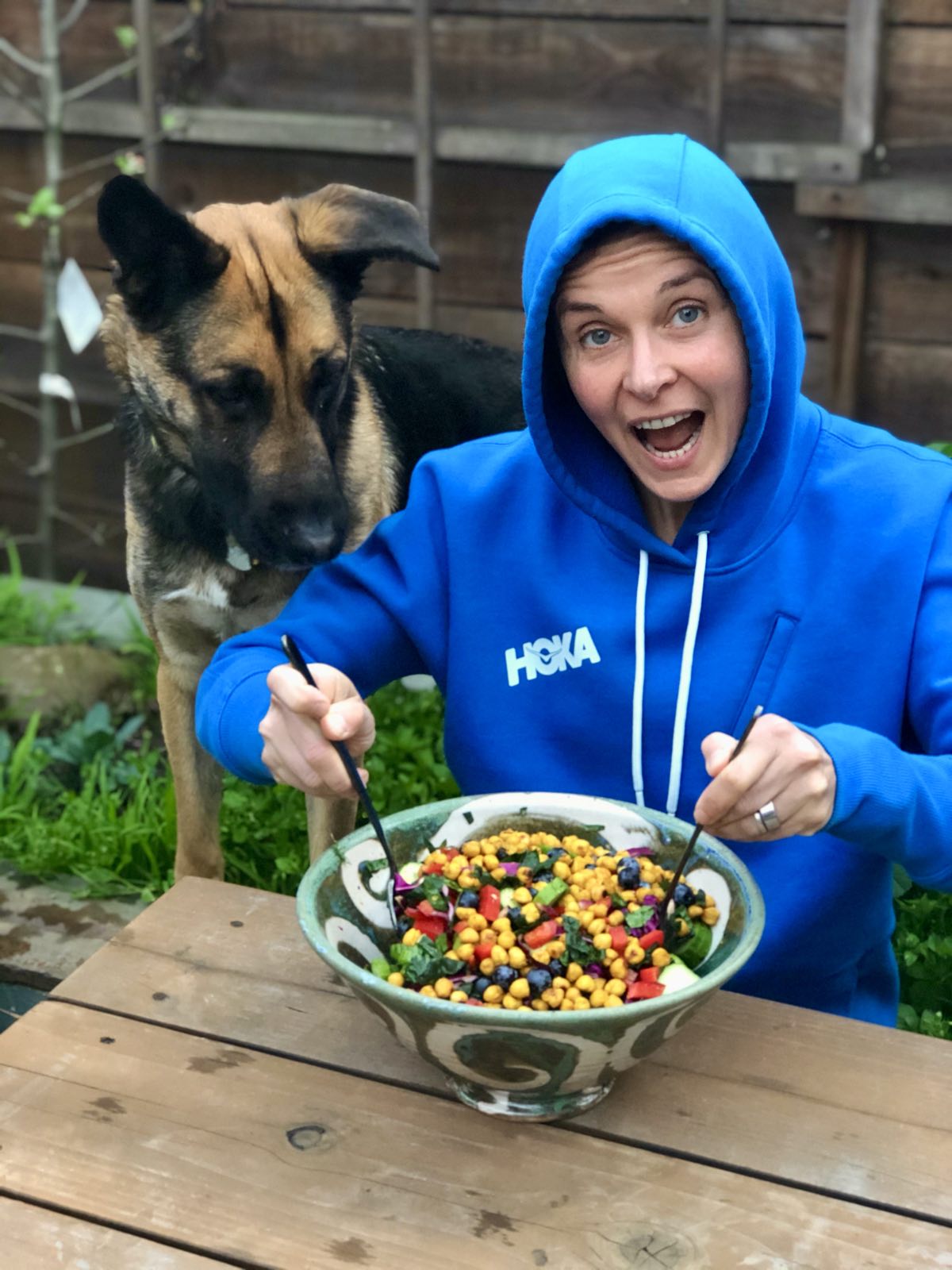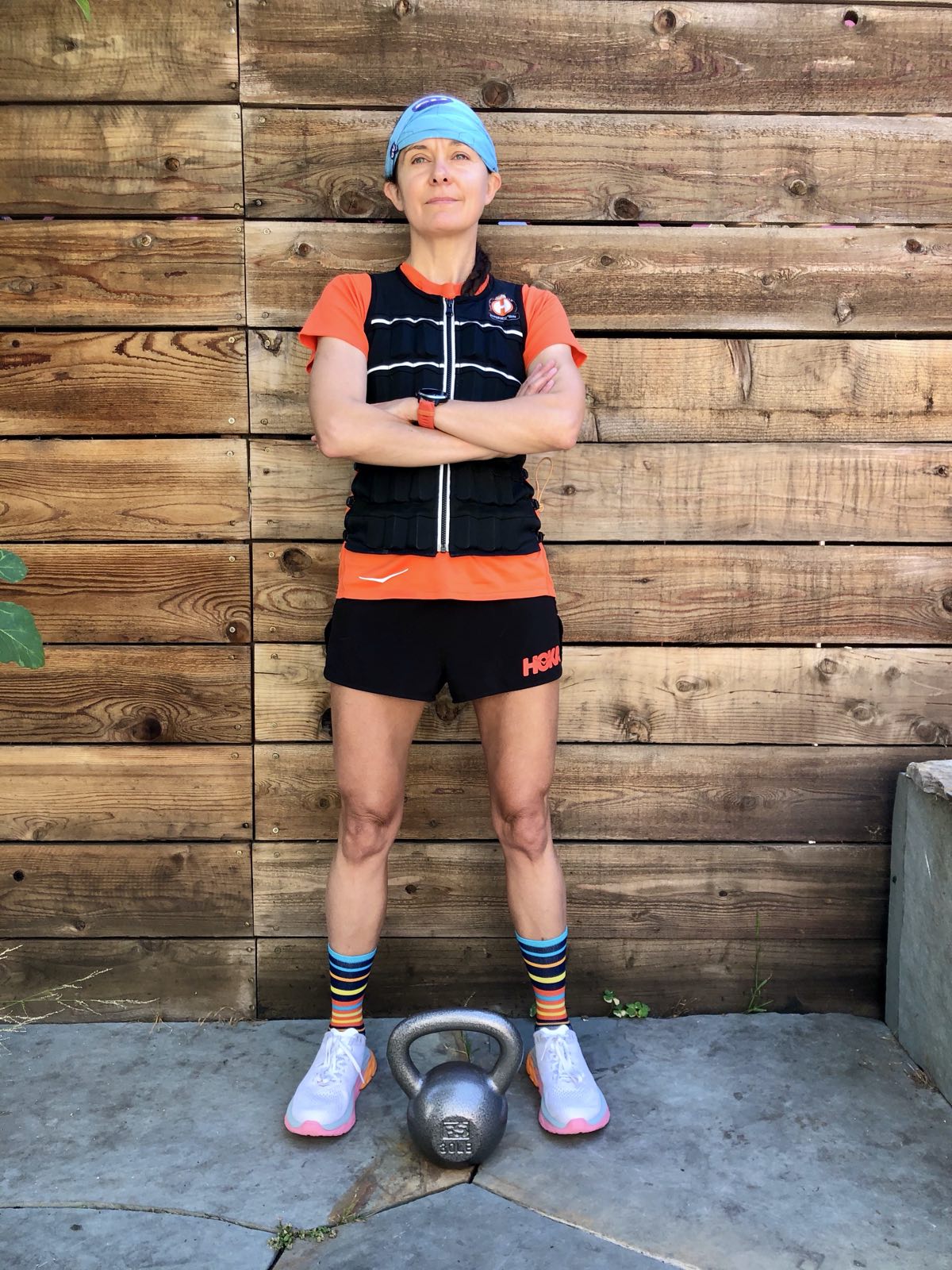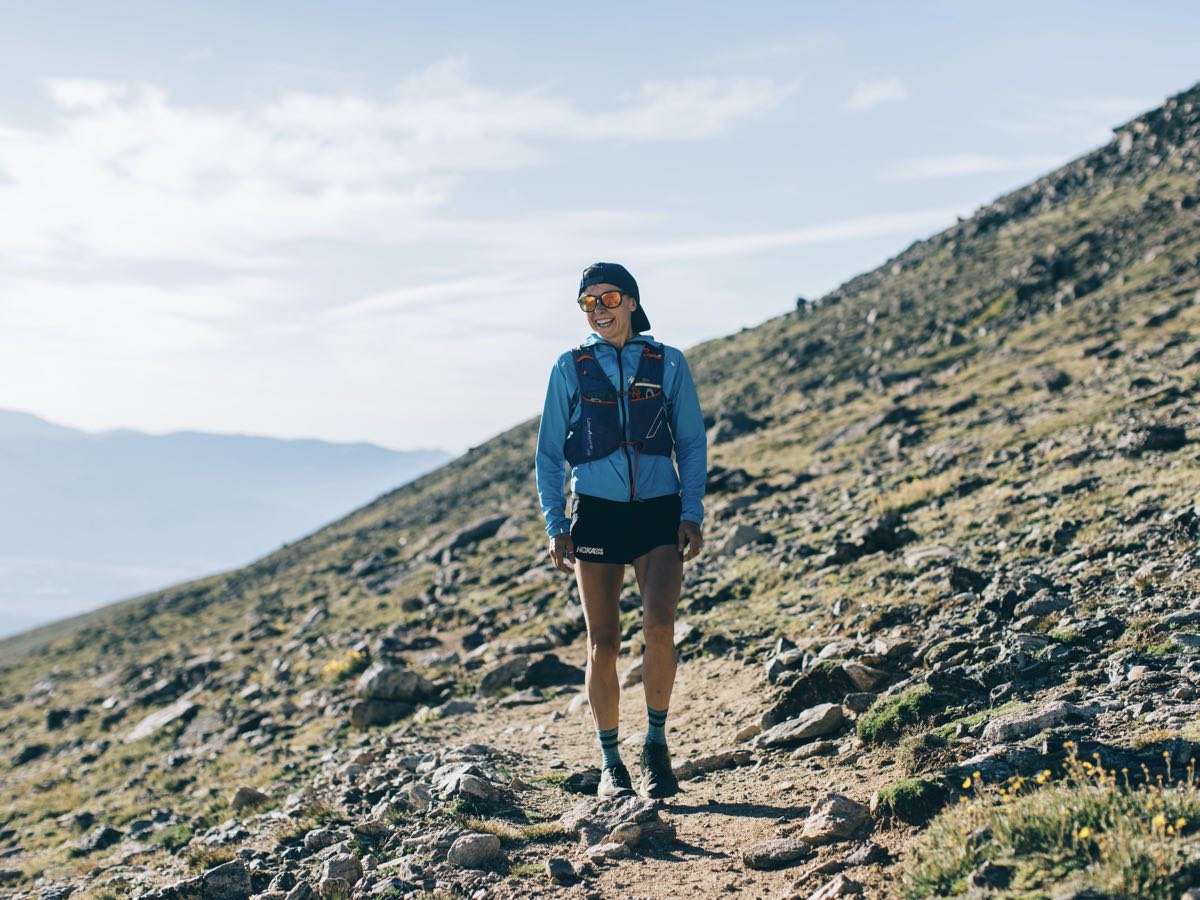‘Age-Old Runners’ is an article series where we explore runners’ performance potential after the age of 45 by interviewing excellent middle-aged runners. Is there still potential to improve? What roles do motivation, mindset, and specific training and recovery techniques play in allowing runners in their mid-40s to mid-60s to continue to excel? To learn more about this series’ goals, check out its introductory article.
Magda Boulet is 46 years old. She started running her senior year of high school, and she ran in college at the University of California at Berkeley, concentrating on 1,500- to 5,000-meter events. She began running marathons professionally after college, training with Jack Daniels, and represented the United States at the 2008 Summer Olympics in Beijing. Her marathon PR is 2:26.
When Magda turned 40 in 2013, she won the USATF Masters 1-Mile Road Championships in 4:50. That same year, she ran her first trail ultramarathon, The North Face Endurance Challenge 50 Mile Championships. She placed second in 7:31:12. She won the following year in 7:08:09. She also won the Western States 100 in 2015 in 19:05:21.
Since turning 45, Magda’s won the Marathon des Sables stage race in Morocco and the Leadville Trail 100 Mile in 20:18:06. She completed the 172-mile Tahoe Rim Trail in 50 hours and 40 minutes, a little more than three hours slower than the supported women’s fastest known time (FKT.)
The following is a transcript of a phone interview with Magda. It has been edited for brevity and clarity.
Does an older runner’s belief in their potential to improve impact their performance?
I definitely think how you say things, whether it’s to yourself or to others, does matter…. It definitely does have an impact, whether it gives you permission not to reach a goal or just to maintain the status quo. It’s sometimes demotivating. And it will have an impact on others as well.
For me… I’m just so optimistic…. I always look for the gaps and the small opportunities, and they are still out there. I am not delusional. There’s no way that now, in my late forties, I’ll be able to run a 2:26 marathon…. There’s no escape from aging, but, at the same time, we all have ways to figure out where we can still improve. I think the beauty of ultrarunning, unlike the shorter stuff, is that there are so many multiple factors that contribute to a successful race, whether you’re in the middle of the pack or up front, or wherever. That excites me because we can all work toward the different areas of what it takes to be successful, whether it’s in a training cycle or a race or a career.
Even in my late forties, I keep finding ways to improve in different areas and figure out what those gaps are for me. [Author’s Note: Magda is about 30 years old as a runner.]
Do you think about your age when you look at the runners you’re racing against?
I don’t compare myself to other people. I learned that in college and post-college, as a pro track-and-field and road runner. I never compare myself to other people because I can’t control other people and what they’re doing, and I never will. I try to focus on what I can control in my environment.
I can control where I go and race, what races I sign up for. And it’s a blessing that there is so much variety in ultra and trail races. You can really focus on where you can bring strengths. My strengths depend on where I live, where I can train, and what I have access to. So I try to play to my strengths. Setting a goal and working toward it brings me joy. If I pick a race that I don’t have a chance to prepare myself properly for, I’m just beating myself up and setting myself up for disappointment.
On the importance of variety in racing.
For me, training and racing is all about the variety, the different kinds of challenges I can set for myself. Variety is what keeps me motivated. And there’s always something I learn along the way. I find, “Wow! I’m pretty good at this.” And that’s an exciting thing after so many years in the sport. The rinse-and-repeat thing doesn’t excite me. It’s more about finding out where the weaknesses are, or where the potential is. That is what gets me out the door everyday. It’s that extra motivation–to seek something uniquely challenging. And with ultra racing, there are also so many interesting parts of the world to experience.
Has your desire to race decreased?
If anything, I’m more excited, and I keep dreaming a lot more these days than ever before. There are so many unique places in the world that I’m drawn to go and explore. And my training exposes me to challenging elements, and there’s so much inspiration in the places where I could go and race. I feel like every year my road-running career was always the same. It was more about mastering the skill set and getting better and better at it. But it was very predictable and very structured. It was just this rinse-repeat mentality. There was definitely beauty within it because year after year, you could see improvement, and it lent to exciting results. But trail running is very different. And I think, in my older age, it’s definitely something that gives me extra motivation.
Races give me a checkmark, a goal, something to put on the calendar and work toward. And, I think, that is a very important part of being able to do this for many years. Setting that goal and sharing that process with other people is really exciting. But if I never raced again, if I still had a chance to get out and run, I’d be fine.
Why do you think older runners stop racing as much?
It always breaks my heart seeing all the people I have competed against in the past that don’t even run. It’s not just not racing. A lot of them stop running. I think that there are two types of runners. There are runners who love running for the sake of running. They’ll be lifetime runners. They’ll figure out a way to get out the door and run because it’s joyous. They love the movement. Then, there’s a type of runner who loves to race. There’s some in-between too, but if you really just love to race, there’s a higher chance of comparing yourself to your younger self. If you’re really about the numbers and getting better, racing is just not as motivating. And I get that. Those are the people we lose along the way because, to them, there is no incentive to get out the door. If you were able to run six-minute miles 10 years ago and now you’re running 10-minute miles, that intrinsic motivation disappears. I am the runner who loves to run and explore. I think that’s one of the biggest factors behind success at anything, is to genuinely enjoy what it is you’re doing. The racing is icing on the cake for me. Racing is a way to be part of the community.
How has getting older impacted your running?
There are certain things I’ve had to modify over the years. One is just getting a lot more cross training into my routine and really focusing on recovery and taking it as seriously as one of the big workout days.
What does taking recovery seriously mean for you?
Taking more recovery days. Even 10 years ago, taking a day off gave me a sense of guilt. I felt like I was going to get left behind because some people were training harder than me. But, after so many years, being older and having more experience, I really understand the role of recovery and adaptation. Also, I really don’t want to sit on the sidelines. My coach, Jack Daniels, always used to say that rest is a part of training. It’s not avoiding training. As a young athlete, that was really hard to understand. I get a lot more out of recovery days now than I did before. Experience has given me the confidence to really take advantage of recovery days because I can see the bigger picture. In the long run, recovery will allow me to be more consistent, and, therefore, I will improve.
Many athletes struggle to understand the body’s recovery needs as they age. Has it been challenging figuring out how to adjust your recovery in your forties?
You know, after so many years, I know exactly when I need it. I give myself permission to really listen to my body and to trust it. I’m able to distinguish between feeling unmotivated versus really needing recovery to prevent overtraining and getting injured.
You learned how to interpret and trust your body’s messages about recovery during your professional running career?
Yes. I learned the most sensitive time when you need to pay attention to recovery is right after a big race. I remember having great races and being afraid to back off too much afterwards. You start to feel like: I’m invincible. I can just build on that. You think: Wow! I had this great race. Where can I go from here? And that is probably the time where you need recovery the most. In the past, I would have trained harder. And that was usually when I started getting injured. It’s underestimating the benefit of recovery for the long haul. And now, with a lot more experience, I fully engage in the recovery process because I know that I’ll get so much more out of the hard work I’ve done.
Is that the advice you’d give to younger runners? Don’t jump right back into training after a good race. Take time to fully recover from the effort.
That’s probably one of my biggest pieces of advice to athletes. I think you need to give yourself permission to recover well. Also, you can take the day off, but if you’re not bought into the process, you don’t get the full benefit. Recovery is more than just not doing something physically hard. It’s also giving yourself a break emotionally and mentally. When you do that, you can sustain the next training cycle. You can fully enjoy it and not just hang on for dear life.
On consistency.
I’ve been able to keep running/training for a very long time, and as you know the training just builds upon itself over the years. Consistency above anything: Strive for consistent training. A little bit every day will go further than an extraordinary training session occasionally.
What role does strength training play in preventing injuries for you?
Huge. My strength-training routine is not as sophisticated as it used to be. It’s more about the volume of strength training now. I do it more frequently. Preserving muscle mass when you’re over 40 is critical. And as a female distance runner, that is another factor that gives me the motivation to put emphasis on strength training. And, you know, that’s another reason for the variety in my training. Instead of just chasing a ton of miles, I treat my strength training as another part of my weekly build-up. A while ago, I stopped focusing on how many miles I’d get in a week. Now it’s how much work I do. And strength training plays a big role.
I incorporate strength training twice a week and spend about 30 to 45 minutes on each session. I have a blend of resistance and plyometric exercises I enjoy and find key to injury prevention. In addition, I also include a prehab routine that takes 15 to 20 minutes on a daily basis.
What is your diet like?
About 10 years ago I decided to stop eating meat for environmental reasons. I focus on a balanced, plant-based approach to nutrition and fueling. I think of my daily nutrition as the foundation and the key to my overall health, athletic performance, and longevity, not just as runner but as a human being. I care deeply about the food I put in my body because what we eat matters. I put a lot of effort into making nourishing and delicious meals that I enjoy eating. I choose foods that support my energy levels, immunity, mental clarity, healthy metabolism, and recovery. I eat mostly a large variety of plants such as whole grains, nuts, seeds, fruit, healthy fats, occasional fish and eggs, and lots of fermented foods.
To me food is beautiful and powerful. I have a wonderful relationship with food mainly because I grew up in a house where we cooked together every day and we always sat down to the dinner table as a family. Now that I have my own little family, I strive to do the same. As much as I focus on making nutrient-dense meals, high in fiber, and with all sorts of colors, I love food because it can bring people together and build community. Healthy food makes me feel good and I enjoy sharing it with the people in my life.
On Fueling Training.
I am very deliberate about my nutrition around training sessions. I eat to support the demands I put on my body so I can thrive daily and in the long run. As my race goals evolve, the training demands change and so do my nutrition needs. I tailor my nutrition to my training cycles with purposeful eating. Just as I apply periodization to my training, I do the same with nutrition. Some days are high volume or high intensity, other days are complete rest. Eating the right nutrients at the right time in sufficient amounts is important to maximize recovery and encourage positive physiological adaptations.
I reduce intake of fat, fiber, and protein near workouts, but increase their consumption the rest of the day. Easily digestible carbohydrates are key for high intensity or very prolonged exercise since your body prefers this fuel source, so I reserve intake of refined sugars around exercise/training time.
On Race Nutrition.
It really depends on the race itself, the course, the environmental conditions, and personal goal. For example, I ran the 2015 Western States 100. That year it took me 19 hours to complete and I raced hard. I consumed liquid calories for 19 hours, drinking 21 ounces of ice-cold Roctane Energy Drink every hour on the hour, plus additional water because it was very hot. That’s 250 calories per hour. And then there was UTMB, which took me 30 hours to complete one year. I struggled to move well and I backed off on my goal. I only ate Stroopwafels along the way, and at aid stations I took my time and enjoyed warm broth with crackers. I wasn’t moving fast, it was cold at night, I had more blood flow going to my gut, and therefore I could digest and absorb more complex food while moving. Two very different 100 milers and my nutrition plan was tailored to consider the demands and goals of each.
Training specifics:
- Weekly running volume: Ten to 15 hours a week
- Strength training: Two times per week and 30 to 45 minutes/session
- Off-season: Long recovery after big race
- Sleep: Mostly eight hours/night
- Race nutrition: GU products
- Recovery: Two weeks off from running after a big race
Three factors Magda attributes her running performance to:
- Fueling and nutrition
- Consistency
- Motivation




